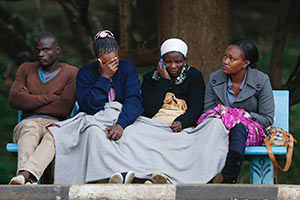CAPE TOWN, South Africa — Since Somali militants killed 36 non-Muslim quarry workers in early December, Christians in Kenya “are living in fear, wondering where the next attack will be,” said Bishop Emanuel Barbara of Malindi, Kenya. Wilson Kabwoya, Helen Akani, Agnes Khasandi and Margaret Naishorua wait for the bodies of their loved ones to arrive at a mortuary in Nairobi, Kenya, Dec. 2. Since Somali militants killed 36 non-Muslim quarry workers in early December, Christians in Kenya “are living in fear, wondering where the next attack will be,” said Bishop Emanuel Barbara of Malindi. (CNS photo/Dai Kurokawa, EPA)
Wilson Kabwoya, Helen Akani, Agnes Khasandi and Margaret Naishorua wait for the bodies of their loved ones to arrive at a mortuary in Nairobi, Kenya, Dec. 2. Since Somali militants killed 36 non-Muslim quarry workers in early December, Christians in Kenya “are living in fear, wondering where the next attack will be,” said Bishop Emanuel Barbara of Malindi. (CNS photo/Dai Kurokawa, EPA)
There is much “confusion and anxiety” among Christians, he said in a Dec. 5 telephone interview from Malindi.
As church leaders, “we are telling our people, ‘Be cautious and pay attention to what’s happening around you; but don’t let anger and vengeance grow in your hearts,'” Bishop Barbara said.
At the same time, Kenya’s Catholic bishops are “putting pressure on the government to change the way the security forces deal with this situation,” he said.
Corruption in Kenya’s security forces is a major problem, he said, noting that to prevent further escalation of tensions, the government needs to ensure that its security forces are strong.
“We would like to see our security forces taking the lead and to have a sense that they are in charge,” Bishop Barbara said, noting that most Kenyans now feel “that it’s the Muslim militants who will decide when and where to attack next.”
In a Dec. 2 attack near Mandera, in Garissa Diocese, which borders Somalia, militants separated the non-Muslims and shot them dead.
Bishop Barbara said it was the latest of many incidents that “make it very clear that fundamentalists are attacking Christians.” A week before this attack, 28 people were killed in an attack on a bus targeting non-Muslims in the same area.
Media reports said Al-Shabab, which said it carried out the attacks, has stepped up its campaign in Kenya since 2011, when Kenya sent troops into Somalia to help battle the militants, according to the British Broadcasting Corp.
Last year, al-Shabab claimed responsibility for an attack on a Nairobi shopping mall in which 67 people were killed by gunmen.
St. Joseph Brother John Mwangi Wambugu told CNS that attendance in churches has waned because of fears of more attacks in places where people are gathered together.
“There is a lot of insecurity and fear among Christians, especially in the coastal regions and northeastern Kenya,” because of their proximity to Somalia as well as the large number of Muslims living in these areas, said Brother Wambugu, director of Caritas for the ecclesiastical province of Mombasa, which includes the Archdiocese of Mombasa and the dioceses of Garissa and Malindi.
Divisions between Christians and Muslims are growing “and people are not as close as they used to be,” Brother Wambugu said in a Dec. 5 telephone interview.
Bishop Barbara said tensions between Muslims and Christians in Kenya “are being created by the fundamentalists” responsible for the attacks on non-Muslims.
“Not trusting your neighbor can lead to aggression,” he said.
The attacks “affect us spiritually as well as materially, with the temptation to give in to hatred and revenge, which threatens our spiritual calling to love and reconciliation,” the bishop said.
Warning against Islamophobia, Brother Wambugu said “groups like al-Shabab will continue to use and exploit such fears to bring about more divisions in the country.”
Among Muslims, there is “fear of retaliation by Christians,” with groups of Christian youths talking “of taking action” in revenge for the attacks, he said.
Both Bishop Barbara and Brother Wambugu noted harm to the country’s economy, as well as to the livelihoods of mostly the poor in affected communities.
After the bus attack, “those who were there have gone back home and won’t return unless they are certain that they will be protected,” the bishop said.
Mandera, where the population is majority Muslim, “will suffer without the services” provided by teachers, doctors and other skilled and unskilled workers from other parts of Kenya who go there to work, Bishop Barbara said.
Muslim leaders need to “speak out loudly and clearly” against the attacks, Bishop Barbara said, noting that “only recently have we heard their condemnation.”
